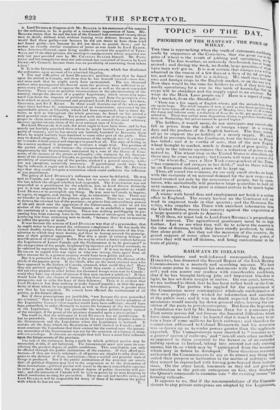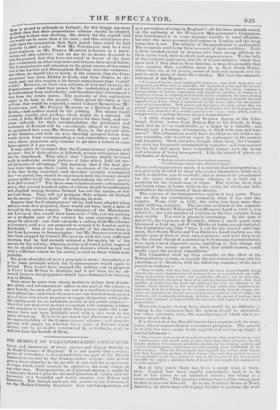RAILWAYS IN IRELAND.
OUR industrious and well-informed correspondent, ANGLO. H IBERNUS, has dissected the Second Report of the Irish Railway Commissioners in a masterly and searching manner. We have taken some pains to compare his statements with the Report it- self ; and can assure our readers with considerable confidence, that if he has brought lurking jobs and important blunders to light, he has set down naught in malice. On one point, however, we are inclined to think that he has been rather hard on the Com- missioners. The parties who applied for the appointment of the Commission never contemplated wholesale condemnation of their own projects : they wished for information and assistance at the public cost ; and it was no doubt expected that the Com- missioners would merely lay down general rules, leaving the exe- cution of the parts to private enterprise. But from the beginning, a foundation was laid by Mr. SPRING RICE for a portentous job. That astute person did not foresee the financial difficulties which have since oppressed him : he fancied that it would be easy to ob- tain a loan of some millions for Irish railways; and therefore the commission addressed to Colonel BURGOYNE and his associates was so drawn up as to confer powers greater than the applicants expected. The Commissioners were directed to " consider as to a general system of railways," and " into all such other methods" as appeared to them essential to the format on of an extended railway system in Ireland, taking into account not only existing means, but these which may be " anticipated from the resources which may in future be developed." These directions certainly authorized the Commissioners to say or do almost any thing that suited their purpose or inclination in the matter of railways; and
they cannot be reproached with having gone beyond their instruc- tions. On the other hand, inasmuch as they did nut give due consideration to the private enterprises on foot, they disobeyed the Queen's comtnands to examine into " the ea isting means" for forming railroads. It appears to us, that if the recommendations of the Commis' sioners to stop private enterprises are adopted by the Legislatures
doe is an end to railroads in Ireland; for few things are more that their preposterous scheme should be adopted.
unlikely than .Cording to their own showing, the return for the capital laid
e would not be more than 4 per cent.; and this calculation pro- elei:ds upon the assumption that their grand lines could be laid dove for 11,000/. a mile. Now Mr. VIGNOLLES may be a very clever engineer, as Mr. PIERCE MAHONY is known as a perse- vering and able solicitor; but we are by no means disposed to take for granted that they have not erred in favour of the lines they recommend, as other engineers and lawyers have erred before. The Commissioners call attention to the great excess of the actual eost of the London and Birmingham Railway over the estimates : but where, we should like to know, is the security that the Com- missioners' line from Dublin to Cork, and from Dublin to Ar- mvh, may not also require a far larger expenditure than 11,000/. mile? However, on their own estimate of cost and returns, the Commissioners admit that money for the undertaking would not be ferthcoming from individuals; and therefore they recommend a loan from the public purse. The necessity of this application ought to be fatal to the project. Once grant the three or roar millions that would be required,—instal Colonel Buoacivtve, Mr. VIGNOLLES, and Mr. PIERCE MAHONY as a Railway Board in Dam,—and endless would be the jobbing. The money would disappear rapidly, and perhaps there might be a railroad. Of verse, if John Bull will pay large prices for their land, and con- struct railroads for their accommodation, the gentlemen and tradesmen of Ireland will be exceedingly obliged to him ; but, we apprehend that even Mr. SPRING RICE, in the present state of the finances, and with no very cheering prospect before him, would shrink from recommending a vast expenditure upon rail- ways, whose projectors only venture to promise a return at some future period of 4 per cent. it may safely be assumed that the Commissioners' scheme will not pass ; but if their advice is followed, private enterprises must also be abandoned. They admit that "parties might be found ready to undertake certain portions of lines which hold out spe- cial prospects of advantage,' but maintain that if the best por- tions were taken up, there would be no chance of the remainder of the line being executed ; and therefore strongly recommend that "no partial line should he sanctioned until the country should yossess within itself the means of undertaking the whole system to its full extent ! ' Yet these same Commissioners subsequently advise, that several hundred miles of railway should be undertaken with English money, because Ireland has not the means, or will not lend them. They will not postpone their scheme till Ireland has the means "within itself" of defraying its cost.
Suppose that the Commissioners' advice had been adopted when railways were first projected, there would not have been a mile of railroad in the entire country. The schemers of the Manchester and Liverpool line would have been told—" Oh, you are picking out a profitable part of the country for your experiment ; this cannot be allowed : you shall not make a railway from Manchester to Liverpool until you are prepared to extend it to London and to Edinburgh." One of the most successful of the smaller lines is that from Leicester to Swannington; but Mr. STEPHENSON would have been stopped by Colonel BURGOYNE with the very sufficient objection, that he had actually selected a favourable bit of the country for his railway, whereas justice and sound policy required that he should extenil his line through districts which would not yield a sufficient return for his outlay as well as those which were profitable.
The gross absurdity of such a principle is clear ; nevertheless it is the same principle which the Commissioners would apply to Ireland. They would have stopped the railway now in progress in Ulster from Belfast to Armagh, had it not been too far ad- vanced, because the proprietors would have demurred to carrvinw it on to Dublin.
There must be some very strong motive to induce men of com- mon ability and information to refuse to one part of the country a great benefit, because all parts are not ill a condition to obtain an equal advantage ; and when these persons are found at work upon a plan of their own which promises to supply themselves with profit- able employment for an indefinite period, at the public expense— when they are moreover in close connexion with notorious jobbers —the suspicion is most potent that their powers under the Com- misdon have not been faithfully used with a sole view to the public advantage. It is to be presumed that Parliament e ill see the impracticability of the Commissioners' scheme ; and t hen the question will simply be, whether those parts of Ireland e here railways can be profitably constructed by in si.all or shall not have the benefit of them.



























 Previous page
Previous page